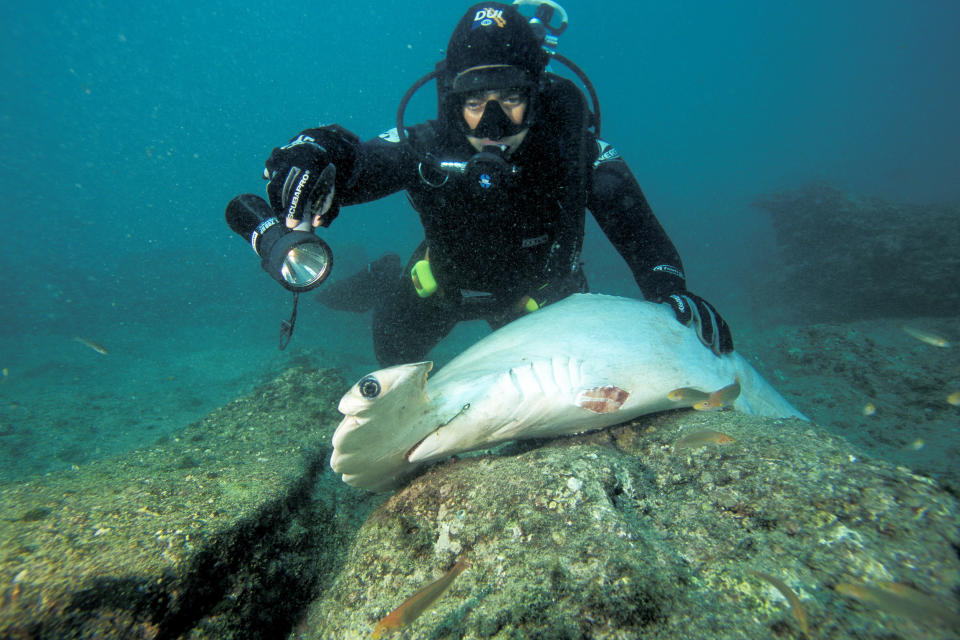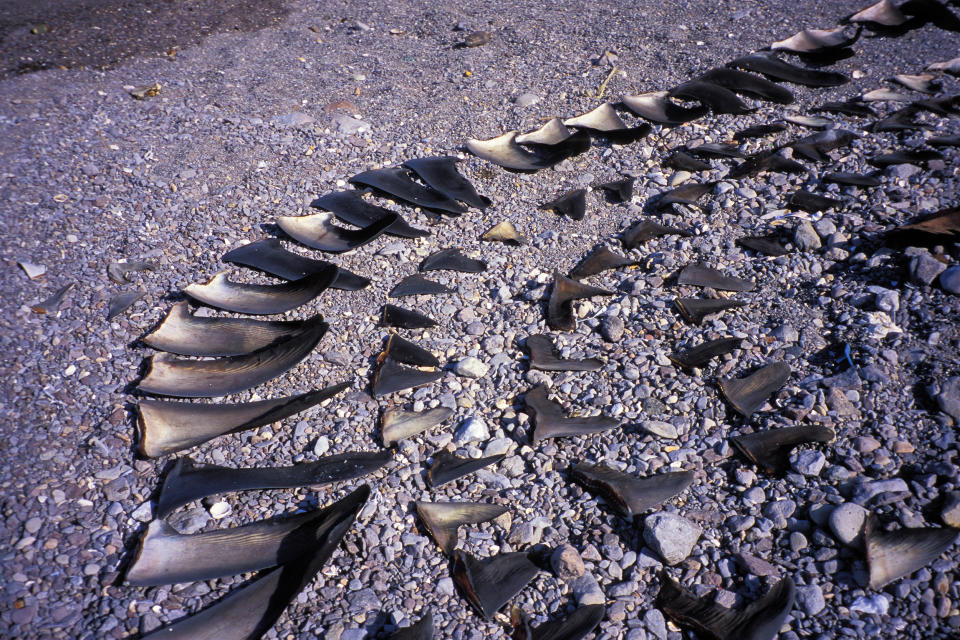U.S. takes aim at global shark fin trade
The U.S. is about to take a bite out of the shark fin trade.
The National Oceanic and Atmospheric Administration, or NOAA, is currently reviewing the funding and implementation of a long-awaited ban on the trafficking of shark fins through U.S. ports, a move that could disrupt their broader global trade.
NOAA’s review comes after President Joe Biden signed the Shark Fin Sales Elimination Act into law in December. It’s a move that some scientists and researchers have fought for years, pointing to a deep debate about just how the U.S. should use its influence to end the global fin trade.
On one side, many experts including some in NOAA and its parent agency, the Department of Commerce, have argued that the new law will undo decades of U.S. work to encourage sustainable practices.
“Domestic bans on harvesting fins would also undermine our efforts to promote international dialogue and negotiations on sustainable shark management,” Chris Oliver, NOAA’s fisheries assistant administrator, wrote in 2020. “Responsibly participating in the global fin trade allows the United States to showcase our strong conservation and management practices overseas.”
The Department of Commerce said in response to a request for comment: “The Department of Commerce, through NOAA Fisheries, is evaluating the newly enacted provision of the National Defense Authorization Act (NDAA) and is reviewing the legislation to determine next steps.” Oliver did not respond to a request for comment.
Others now see a different path for U.S. leadership that is less about embracing sustainable fishing and more focused on disrupting the global market for shark fins.
“The big market is not within the U.S.,” said Andrew Rosenberg, the interim director of the Center for Ocean Leadership, which manages and facilitates ocean research and education programs under the University Corporation for Atmospheric Research. “But when we go into international organizations we have to be able to say we’ve gotten our house in order, and we want other countries to do the same.”
The new law effectively ends the United States’ participation in the global shark fin trade, making it illegal to possess, buy, sell or transport shark fins or any product containing shark fins, except for certain dogfish fins.

Finning has been illegal in the United States since the 1990s, though the U.S. had continued to trade fins with countries that do not prohibit the practice, often serving as an intermediary for the trade, said Gib Brogan, a campaign director at Oceana, a nonprofit ocean conservation organization. Finning, which involves the act of slicing a shark’s fin and discarding the still-living body back into the ocean, is seen as a major threat to shark populations, including endangered species.
In 2010, Hawaii became the first state to ban the “possession, sale and distribution of shark fins.” 17 states and three U.S. territories have banned sale on shark fins, according to the Humane Society of the United States.
Shark fin soup is considered a delicacy in Asian communities, causing a demand for fins. Although the other ingredients and spices give the soup its taste, shark fin is the main ingredient and credited for the soup’s chewy, gelatinous texture. In Chinese culture, shark fin soup is considered a culinary status symbol, served during banquets and weddings.
According to the nonprofit Animal Welfare Institute, an estimated 73 million sharks are killed yearly for their fins alone. The International Union for Conservation of Nature’s Shark Specialist Group found that around 77% of oceanic shark and ray species were threatened by extinction in 2021.
However, the U.S. accounts for only about 1% of the global shark fin trade, according to David Shiffman, a research associate with Arizona State University. Furthermore, the ban does not address the main threat to sharks, which is unsustainable overfishing.
Based on a study co-authored by Shiffman and Robert Hueter, the director for shark research at the Mote Center, which focuses on sustainable use of marine biodiversity and conservation, the U.S. has played a leadership role in promoting sustainable shark fisheries around the world.
“We are removing some of the most sustainable shark fisheries in the world from the marketplace at the time when they’re most needed as examples of what to do better,” Shiffman said.
The U.S. law may not make a big dent in that trade, but it does add to a growing momentum for bigger and bolder efforts to ban the trade of shark fins.

In January, campaign organizers submitted a European Citizens’ Initiative to the European Commision to end the trade in the European Union. The initiative received more than 1.1 million signatures from E.U. citizens. The commission now has 6 months to decide if it will follow through with the request.
The E.U. has banned shark finning since 2003; however, according to the International Fund for Animal Welfare, an organization focused on animal protection and rescue, E.U. member states supplied 45% of the shark-fin related products imported to Hong Kong, Singapore and Taiwan in 2020.
Passage of the Shark Fin Sales Elimination Act in the U.S. was a hard fought victory for conservationists who are now advising NOAA in hopes of ensuring that the ban is strongly enforced.
“You want to make sure they’ve got the resources to get the job done,” said Sara Amundson, president of the Humane Society Legislative Fund, a group working to pass animal protection laws. “So there’s more work to be done. But let’s take some time right now to just celebrate the fact that this is a bill with a long trajectory that has finally been signed into law.”
This article was originally published on NBCNews.com

